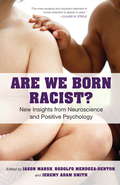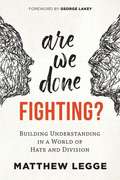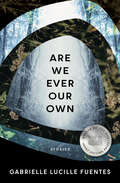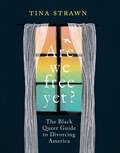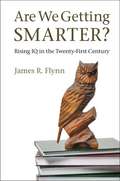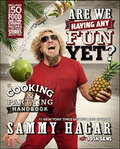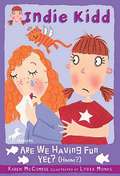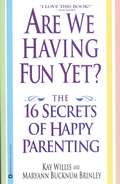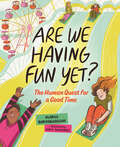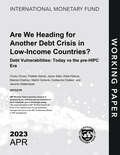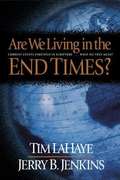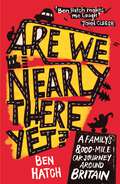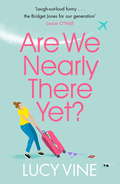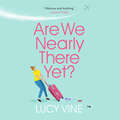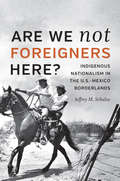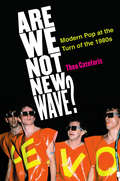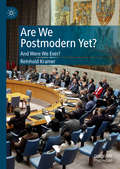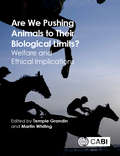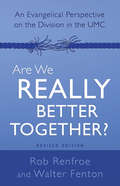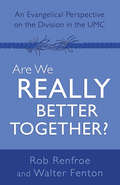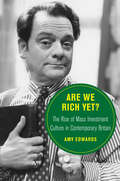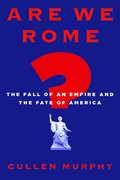- Table View
- List View
Are We Born Racist?
by Jeremy A. Smith Jason Marsh Rodolfo Mendoza-DentonWhere do our prejudices come from? Why are some people more biased than others? Is it possible for individuals, and society as a whole, to truly defeat prejudice? In these pages, leading scientists, psychologists, educators, activists, and many others offer answers, drawing from new scientific discoveries that shed light on why and how our brains form prejudices, how racism hurts our health, steps we can take to mitigate prejudiced instincts, and what a post-prejudice society might actually look like. Bringing a diverse range of disciplines into conversation for the first time, Are We Born Racist? offers a straightforward overview of the new science of prejudice, and showcases the abundant practical, research-based steps that can be taken in all areas of our lives to overcome prejudice.
Are We Done Fighting?: Building Understanding In A World Of Hate And Division
by George Lakey Matthew Legge Adam FarnsworthUnfounded beliefs and hateful political and social divisions that can cascade into violence are threatening to pull the world apart. Responding to fear and aggression strategically and with compassion is vital if we are to push back against the politics of hate and live in greater safety and harmony. <p> But how to do it? <p> Are We Done Fighting? is brimming with the latest research, practical activities, and inspirational stories of success for cultivating inner change and spreading peace at the community level and beyond. <p> Packed with inspiration and cutting-edge findings from fields including neuroscience, social psychology, and behavioural economics, Are We Done Fighting? is an essential toolkit for activists, community and peace groups, and students and instructors working to build dialogue, understanding, and peace as the antidote to the politics of hate and division.
Are We Ever Our Own (American Reader Series #38)
by Gabrielle Lucille FuentesMoving between Cuba and the U.S., the stories in Are We Ever Our Own trace the paths of the women of the far-flung Armando Castell family. Related but unknown to each other, these women are exiles, immigrants, artists, outsiders, all in search of a sense of self and belonging. The owner of a professional mourning service investigates the disappearance of her employees. On the eve of the Cuban revolution, a young woman breaks into the mansion where she was once a servant to help the rebels and free herself. A musician in a traveling troupe recounts the last day she saw her father. Linked by theme and complex familial bonds, these stories shift across genres and forms to excavate the violence wreaked on women’s bodies and document the attempt to create something meaningful in the face of loss. They ask: who do we belong to? What, if anything, belongs to us?
Are We Free Yet?: The Black Queer Guide to Divorcing America
by Tina Strawn"Liberation is ultimately a celebration of our deepest humanity, and our fight for it must include a deeper examination of how we relate to oppressive systems while centering our joy, peace, and pleasure." — Tina StrawnAre We Free Yet? The Black Queer Guide to Divorcing America is simultaneously a personal reflection and a collective examination of our relationship to liberation and oppression. In it, Tina Strawn, host of the Speaking of Racism podcast and Instagram platform of the same name, shares her intimate experiences of queerness and Blackness, heartbreak and loss, foreign and home, as she navigates and finds freedom. Alongside Tina's personal journey through a year of challenging transitions, Are We Free Yet? offers an interactive guide to four pillars of activism: joy, liberation, pleasure, and connection. From the role of cannabis to the importance of embracing our grief, this book offers a critical take on all it means to be an activist, offering deep reflection and discussions on race, social change, sex, and healing. Divorce expert (divorced from a husband, a wife, and a country) and author Tina Strawn will challenge readers to: Question what freedom means and looks like in their lives. Consider what leaving the country could look like for them. See themselves (their preferences, personality traits, and biases) in their activism. Deeply investigate what it means to them to be an American and to love or not love "your" country. About the Author: Tina Strawn is a joy and liberation advocate, activist, author, and the owner and host of the Speaking of Racism (IG: @speakingofracism) podcast. The heart of her work is leading Legacy Trips (IG: @legacytrips), immersive antiracism experiences where participants visit historical locations such as Montgomery and Selma, AL, and utilize spiritual practices as tools to affect personal and collective change. Tina has three adult children, an ex-husband, an ex-wife, and an ex-country. She has been a full-time minimalist nomad since February 2020. Tina travels the globe speaking, writing, teaching, and exploring where on the planet she can feel safe and free in her/their queer, Black, woman-identifying body.
Are We Getting Smarter?
by James R. FlynnThe 'Flynn effect' is a surprising finding, identified by James R. Flynn, that IQ test scores have significantly increased from one generation to the next over the past century. Flynn now brings us an exciting new book which aims to make sense of this rise in IQ scores and considers what this tells us about our intelligence, our minds and society. Are We Getting Smarter? features fascinating new material on a variety of topics including the effects of intelligence in the developing world; the impact of rising IQ scores on the death penalty, cognitive ability in old age and the language abilities of youth culture; as well as controversial topics of race and gender. He ends with the message that assessing IQ goes astray if society is ignored. As IQ scores continue to rise into the twenty-first century, particularly in the developing world, the 'Flynn effect' marches on.
Are We Having Any Fun Yet?: The Cooking & Partying Handbook
by Sammy Hagar Josh SensIndulge yourself in the superstar rocker and #1 New York Times bestselling author’s raucous and delicious lifestyle with this bold cookbook and entertaining guide, complete with stories from a lifetime of food, signature recipes and drinks, and featuring lavish full-color photos.For over twenty years, Sammy Hagar has redefined the relationship between good food and good music through his iconic Cabo Wabo tequila brand, his popular chain of Cabo Wabo Cantina restaurants, and his newly launched rum—Sammy’s Beach Bar Rum. Now with Are We Having Any Fun Yet? any Sammy fan can eat, drink, and party like the Red Rocker himself, as Sammy shares his love of food, drinks, and rock-and-roll.Bringing you into the kitchen, behind the bar, and into the center of the party like never before, Sammy shares his deep passion for food and his secrets for rock-and-roll entertaining, including his favorite recipes from home, on the road, and his go-to vacation spots, Cabo and Maui. Coming along for the ride are a wealth of crazy tales, celebrity chefs from around the globe, and stories that reveal the inspiration behind his favorite recipes.Tracing Sammy’s culinary path through the decades, Are We Having Any Fun Yet? offers a fascinating glimpse into Sammy’s evolution as a cook and as a musician, showing how these twin passions have fueled each other, and how he brings a rock star attitude of simplicity and fun to everything he does in the kitchen. Of course, nothing goes better with a great meal than a good drink. Here are Sammy’s greatest drink recipes accompanied by true stories of the wild nights that brought them to life.With even more rock stories from the road and his table, over fifty food and drink recipes, and Sammy’s tips for entertaining like a rock star, Are We Having Any Fun Yet? gives fans everything they need to party the Cabo Wabo way.
Are We Having Fun Yet? (Hmm?)
by Karan Mccombie Lydia MonksIndie Kidd is simply crazy about animals. She feels terrible when her best(est) friend Fee's cat is run over. Poor Fee is lost without her beloved pet, Garfield. Indie will do anything to help her super-sad friend feel glad again. She's ready to put her cheer-up-Fee plan into action. But is Fee ready to have fun yet?
Are We Having Fun Yet?: The 16 Secrets of Happy Parenting
by Kay Willis Maryann Bucknum BrinleyBased on 20 years of successful workshops, the founder of Mothers Matter shares a wealth of advice and practical tips for both new and experienced parents on how to raise happy children -- and have fun doing it. Twenty years ago, Kay Willis, a New Jersey mother of 10 children, realized that mothers needed a forum to learn from each other and increase their skills, confidence, and enjoyment as parents. As the founder of Mothers Matter, an educational organization which helps thousands of parents across the country, Willis offers workshops for new and single parents, working mothers and fathers, and even grandparents. Believing that parenting is a profession, and that no other profession makes as important a contribution to society, Willis has distilled the shared wisdom of her fellow parents into this concise and wonderful guide.
Are We Having Fun Yet?: The Human Quest for a Good Time (Orca Timeline #2)
by Maria BirminghamKey Selling Points The human desire to have fun is universal and timeless. This book is accessible to young readers who will leave armed with interesting facts and specific examples of how humans have had fun from ancient times to today, grouped by topics such art, sport and leisure. Play is important to healthy brain development in children as well as their intellectual, social and emotional development. The author is an award-winning established nonfiction writer, was the managing editor at OWL magazine for 5 years and now works as a freelance writer, editor and contributor to OWL and CBC Kids.
Are We Heading for Another Debt Crisis in Low-Income Countries? Debt Vulnerabilities: Today vs the pre-HIPC Era
by ZettelmeyerA report from the International Monetary Fund.
Are We Living In The End Times?
by Tim Lahaye Jerry B. JenkinsAn explanation of things that must be fulfilled before the second coming of Christ and a look into end time profacy.
Are We Nearly There Yet?: A Family's 8,000-Mile Car Journey Around Britain
by Ben HatchWhen Ben and Dinah saw the advert looking for a husband and wife team with young kids to write a guidebook about family travel around Britain, they jumped at the chance. They embark on a mad-cap five-month trip, embracing the freedom of the open road with a spirit of discovery and an industrial supply of baby wipes.
Are We Nearly There Yet?: A Family's 8,000-Mile Car Journey Around Britain
by Ben HatchWhen Ben and Dinah saw the advert looking for a husband and wife team with young kids to write a guidebook about family travel around Britain, they jumped at the chance. They embark on a mad-cap five-month trip, embracing the freedom of the open road with a spirit of discovery and an industrial supply of baby wipes.
Are We Nearly There Yet?: The ultimate laugh-out-loud read to escape with
by Lucy Vine'Laugh-out-loud funny. Truly, the Bridget Jones for our generation' Louise O'NeillAlice is turning thirty and is stuck in a rut. Her friends are all coupling up and settling down, while she's still working as a temp, trying (and failing) not to shag her terrible ex, getting thrown out of clubs, and accidentally sexting her boss...She decides to throw caution to the wind and jets off on a round-the-world adventure to #FindTheFun and find herself. Of course, she's no more likely to find the answer to true happiness on the beach in Thailand than she is at the electric beach in Tooting, but at least in Thailand there's paddleboard yoga.Can Alice find happiness on her travels? Or is she more likely to lose herself all over again...?'Utterly addictive and utterly charming...her best yet' Daisy Buchanan'Warning: read this book and you will doubtless snort with laughter in inappropriate public places. Quite simply, #brilliant' Ella Dove
Are We Nearly There Yet?: The ultimate laugh-out-loud read to escape with in 2020
by Lucy VineEscape on a round-the-world trip with Lucy Vine's hilarious novel about FOMO, #findingthefun and losing yourself - longlisted for the Comedy Women in Print Prize 2020'Made me scream laughing. I enjoyed it SO much' Marian Keyes'Have you ever messed up so badly you had to leave the country? This feelgood journey contains one of the best vagina jokes ever. We didn't want it to end' Heat MagazineAlice is turning thirty and is stuck in a rut. Her friends are all coupling up and settling down, while she's still working as a temp, trying (and failing) not to shag her terrible ex, getting thrown out of clubs, and accidentally sexting her boss...She decides to throw caution to the wind and jets off on a round-the-world adventure to #FindTheFun and find herself. Of course, she's no more likely to find the answer to true happiness on the beach in Thailand than she is at the electric beach in Tooting, but at least in Thailand there's paddleboard yoga.Can Alice find happiness on her travels? Or is she more likely to lose herself all over again...?'Really, really funny, but also kind of heart wrenching' Sophie Kinsella'Hilarious and touching' Louise O'Neill 'Warning: read this book and you will doubtless snort with laughter in inappropriate public places. Quite simply, #brilliant' Ella Dove'Her best work yet: it's funner, it's more tender . . . You need to have this in your beach bag' Laura Jane Williams'I tore through this quicker than a duty-free Toblerone . . . Wickedly funny and painfully perceptive' Lauren Bravo'Utterly addictive and utterly charming...her best yet' Daisy Buchanan'A bawdy breath of fresh air' Sunday Mirror
Are We Nearly There Yet?: The ultimate laugh-out-loud read to escape with in 2020
by Lucy VineAlice is turning thirty and is stuck in a rut. Her friends are all coupling up and settling down, while she's still working as a temp, trying (and failing) not to shag her terrible ex, getting thrown out of clubs, and accidentally sexting her boss...She decides to throw caution to the wind and jets off on a round-the-world adventure to #FindTheFun and find herself. Of course, she's no more likely to find the answer to true happiness on the beach in Thailand than she is at the electric beach in Tooting, but at least in Thailand there's paddleboard yoga.Can Alice find happiness on her travels? Or is she more likely to lose herself all over again...?(p) Orion Publishing Group 2019
Are We Not Foreigners Here?: Indigenous Nationalism in the U.S.-Mexico Borderlands
by Jeffrey M. SchulzeSince its inception, the U.S.-Mexico border has invited the creation of cultural, economic, and political networks that often function in defiance of surrounding nation-states. It has also produced individual and group identities that are as subversive as they are dynamic. In Are We Not Foreigners Here?, Jeffrey M. Schulze explores how the U.S.-Mexico border shaped the concepts of nationhood and survival strategies of three Indigenous tribes who live in this borderland: the Yaqui, Kickapoo, and Tohono O'odham. These tribes have historically fought against nation-state interference, employing strategies that draw on their transnational orientation to survive and thrive. Schulze details the complexities of the tribes' claims to nationhood in the context of the border from the nineteenth century to the present. He shows that in spreading themselves across two powerful, omnipresent nation-states, these tribes managed to maintain separation from currents of federal Indian policy in both countries; at the same time, it could also leave them culturally and politically vulnerable, especially as surrounding powers stepped up their efforts to control transborder traffic. Schulze underlines these tribes' efforts to reconcile their commitment to preserving their identities, asserting their nationhood, and creating transnational links of resistance with an increasingly formidable international boundary.
Are We Not New Wave?: Modern Pop at the Turn of the 1980s
by Theo CateforisNew wave emerged at the turn of the 1980s as a pop music movement cast in the image of punk rock’s sneering demeanor, yet rendered more accessible and sophisticated. Artists such as the Cars, Devo, the Talking Heads, and the Human League leapt into the Top 40 with a novel sound that broke with the staid rock clichés of the 1970s and pointed the way to a more modern pop style. In Are We Not New Wave? Theo Cateforis provides the first musical and cultural history of the new wave movement, charting its rise out of mid-1970s punk to its ubiquitous early 1980s MTV presence and downfall in the mid-1980s. The book also explores the meanings behind the music’s distinctive traits—its characteristic whiteness and nervousness; its playful irony, electronic melodies, and crossover experimentations. Cateforis traces new wave’s modern sensibilities back to the space-age consumer culture of the late 1950s/early 1960s. Three decades after its rise and fall, new wave’s influence looms large over the contemporary pop scene, recycled and celebrated not only in reunion tours, VH1 nostalgia specials, and “80s night” dance clubs but in the music of artists as diverse as Rihanna, Lady Gaga, Miley Cyrus, and the Killers.
Are We Pears Yet?
by Miranda PaulTwo seeds can't wait to be pears, but growing takes time and patience in this funny and informative picture book from Miranda Paul, the author of Water is Water."When will we be pears?" —"After we find soil." "Hooray! We are going to be pears! Are we pears yet?" —"No! Just be patient and wait."Written entirely in dialogue and staged as a play, Are We Pears Yet? is a clever and hilarious informational picture book that will make you look at growth cycles and fruit trees in a whole new way. Carin Berger's artfully composed collaged stage sets will delight and amaze you.
Are We Postmodern Yet?: And Were We Ever?
by Reinhold KramerIn this book, Reinhold Kramer explores a variety of important social changes, including the resistance to objective measures of truth, the rise of “How-I-Feel” ethics, the ascendancy of individualism, the immersion in cyber-simulations, the push toward globalization and multilateralism, and the decline of political and religious faiths. He argues that the displacement, since the 1990s, of grand narratives by ego-based narratives and small narratives has proven inadequate, and that selective adherence, pluralist adaptation, and humanism are more worthy replacements. Relying on evolutionary psychology as much as on Charles Taylor, Kramer argues that no single answer is possible to the book title’s question, but that the term “postmodernity” – referring to the era, not to postmodernism – still usefully describes major currents within the contemporary world.
Are We Pushing Animals to Their Biological Limits?: Welfare and Ethical Implications
by Temple Grandin Martin WhitingStimulating and thought-provoking, this important new text looks at the welfare problems and philosophical and ethical issues that are caused by changes made to an animal's telos, behaviour and physiology, both positive and negative, to make them more productive or adapted for human uses. These changes may involve selective breeding for production, appearance traits, or competitive advantage in sport, transgenic animals or the use of pharmaceuticals or hormones to enhance production or performance. Changes may impose duties to care for these animals further and more intensely, or they may make the animal more robust. The book considers a wide range of animals, including farm animals, companion animals and laboratory animals. It reviews the ethics and welfare issues of animals that have been adapted for sport, as companions, in work, as ornaments, food sources, guarding and a whole host of other human functions. This important new book sparks debate and is essential reading for all those involved in animal welfare and ethics, including veterinarians, animal scientists, animal welfare scientists and ethologists.
Are We Really Better Together? Revised Edition: An Evangelical Perspective on the Division in The UMC
by Rob Renfroe Walter FentonThe authors set out to address the division within The United Methodist Church and contend that remaining united is hurting the church and the proclamation of the gospel. Recognizing that conservative and progressive Methodists are sincere in their beliefs, the authors doubt that one side will convince the other to change their minds. They therefore suggest that a fair and amicable separation is the best course of action. "The United Methodist Church is at a crossroads. We are a divided church and the truth is we are a hurting church.Some of us believe that our differences are so great and the ongoing battle so destructive that it’s time to part ways. For over four decades conservative and progressive United Methodists have expended enormous emotional, financial and spiritual resources to gain the upper hand in a denomination that has declined every year since its founding in 1968. Surely our efforts and our finances would be better devoted to evangelism, discipleship and missions. For the sake of the lost and the poor, shouldn’t we set each other free to pursue what we believe to be God’s calling upon our lives and our ministries?" (From the Introduction)
Are We Really Better Together?: An Evangelical Perspective on the Division in The UMC
by Rob Renfroe Walter FentonThe authors set out to address the division within The United Methodist Church and contend that remaining united is hurting the church and the proclamation of the gospel. Recognizing that conservative and progressive Methodists are sincere in their beliefs, the authors doubt that one side will convince the other to change their minds. They therefore suggest that a fair and amicable separation is the best course of action. "The United Methodist Church is at a crossroads. We are a divided church and the truth is we are a hurting church. Some of us believe that our differences are so great and the ongoing battle so destructive that it’s time to part ways. For over four decades conservative and progressive United Methodists have expended enormous emotional, financial and spiritual resources to gain the upper hand in a denomination that has declined every year since its founding in 1968. Surely our efforts and our finances would be better devoted to evangelism, discipleship and missions. For the sake of the lost and the poor, shouldn’t we set each other free to pursue what we believe to be God’s calling upon our lives and our ministries?" (From the Introduction)
Are We Rich Yet?: The Rise of Mass Investment Culture in Contemporary Britain (Berkeley Series in British Studies #21)
by Amy EdwardsAn in-depth history of how finance remade everyday life in Thatcher's Britain.Are We Rich Yet? tells the story of the financialization of British society. During the 1980s and 1990s, financial markets became part of daily life for many Britons as the practice of investing moved away from the offices of the City of London, onto Britain’s high streets, and into people’s homes. The Conservative Party claimed this shift as evidence that capital ownership was in the process of being democratized. In practice, investing became more institutionalized than ever in late-twentieth-century Britain: inclusion frequently meant tying one’s fortunes to the credit, insurance, pension, and mortgage industries to maintain independence from state-run support systems. In tracing the rise of a consumer-oriented mass investment culture, historian Amy Edwards explains how the "financial" become such a central part of British society, not only economically and politically, but socially and culturally, too. She shifts our focus away from the corridors of Whitehall and towards a cast of characters that included brokers, bankers and traders, newspaper editors, goods manufacturers, marketing departments, production companies, and hundreds of thousands of ordinary men and women. Between them, they shaped the terrain upon which political and economic reform occurred. Grappling with the interactions between structural transformation and the rhythms of everyday life, Are We Rich Yet? thus understands the rise of neoliberalism as something other than the inevitable outcome of a carefully orchestrated right-wing political revolution.
Are We Rome?: The Fall of an Empire and the Fate of America
by Cullen MurphyWhat went wrong in imperial Rome, and how we can avoid it: “If you want to understand where America stands in the world today, read this."??—??Thomas E. RicksThe rise and fall of ancient Rome has been on American minds since the beginning of our republic. Depending on who’s doing the talking, the history of Rome serves as either a triumphal call to action??—??or a dire warning of imminent collapse.In this “provocative and lively” book, Cullen Murphy points out that today we focus less on the Roman Republic than on the empire that took its place, and reveals a wide array of similarities between the two societies (The New York Times). Looking at the blinkered, insular culture of our capitals; the debilitating effect of bribery in public life; the paradoxical issue of borders; and the weakening of the body politic through various forms of privatization, Murphy persuasively argues that we most resemble Rome in the burgeoning corruption of our government and in our arrogant ignorance of the world outside??—??two things that must be changed if we are to avoid Rome’s fate.“Are We Rome? is just about a perfect book. . . . I wish every politician would spend an evening with this book.”??—??James Fallows
